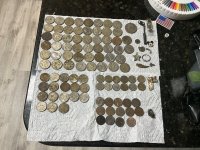moonshine
Sr. Member
- Dec 29, 2006
- 300
- 7
- Detector(s) used
- White's 6000 Di/Pro, E-Trac
ill tell you what i think, and then you tell me why it is wrong. im curious to learn more about this subject.
the detector creates/projects an electromagnetic field, then picks up a field generated by a metal (conductive) object.
i do not understand how "air" can interfere with an electromagnetic field.
if anything i would think an air test would be the maximum depth you could acheive, PLUS the conductivity created by the coin "charging up" the surrounding soil over time MINUS the interference from the ground minerals.
(with the two detectors i have used in my life the air test has been a good indicator of the detectors performance in the field.)
really curious to learn more about the subject.
the detector creates/projects an electromagnetic field, then picks up a field generated by a metal (conductive) object.
i do not understand how "air" can interfere with an electromagnetic field.
if anything i would think an air test would be the maximum depth you could acheive, PLUS the conductivity created by the coin "charging up" the surrounding soil over time MINUS the interference from the ground minerals.
(with the two detectors i have used in my life the air test has been a good indicator of the detectors performance in the field.)
really curious to learn more about the subject.

Upvote
0


 Air test's are convenient and very educational when you are stuck indoors and want to learn some neat stuff about your particular machine. Trust me, there is ALOT to learn and I mean, quite a bit more, than you think you already know about your unit. As a matter of fact, I'm going to take a little step out on this limb here and say that, I'll bet anyone, right here, and right now, that done with sincere interest & lots of learning as the reason or motive, air testing will teach even you, much about your detector that you did not already know. Any takers?
Air test's are convenient and very educational when you are stuck indoors and want to learn some neat stuff about your particular machine. Trust me, there is ALOT to learn and I mean, quite a bit more, than you think you already know about your unit. As a matter of fact, I'm going to take a little step out on this limb here and say that, I'll bet anyone, right here, and right now, that done with sincere interest & lots of learning as the reason or motive, air testing will teach even you, much about your detector that you did not already know. Any takers? 

 Knowledge IS good. 8)
Knowledge IS good. 8)




